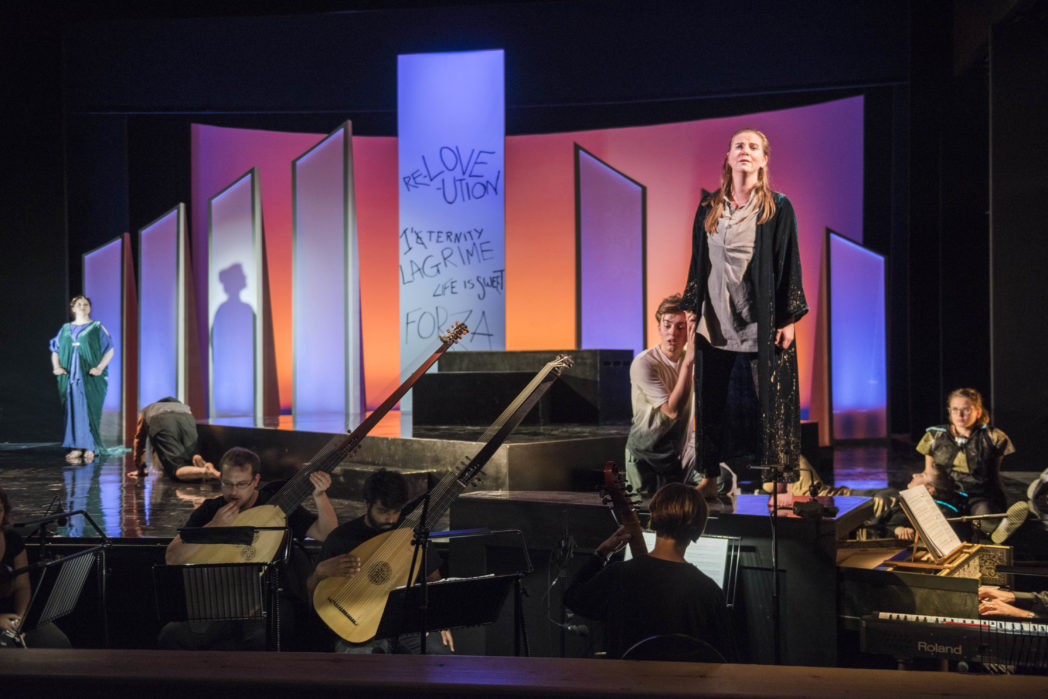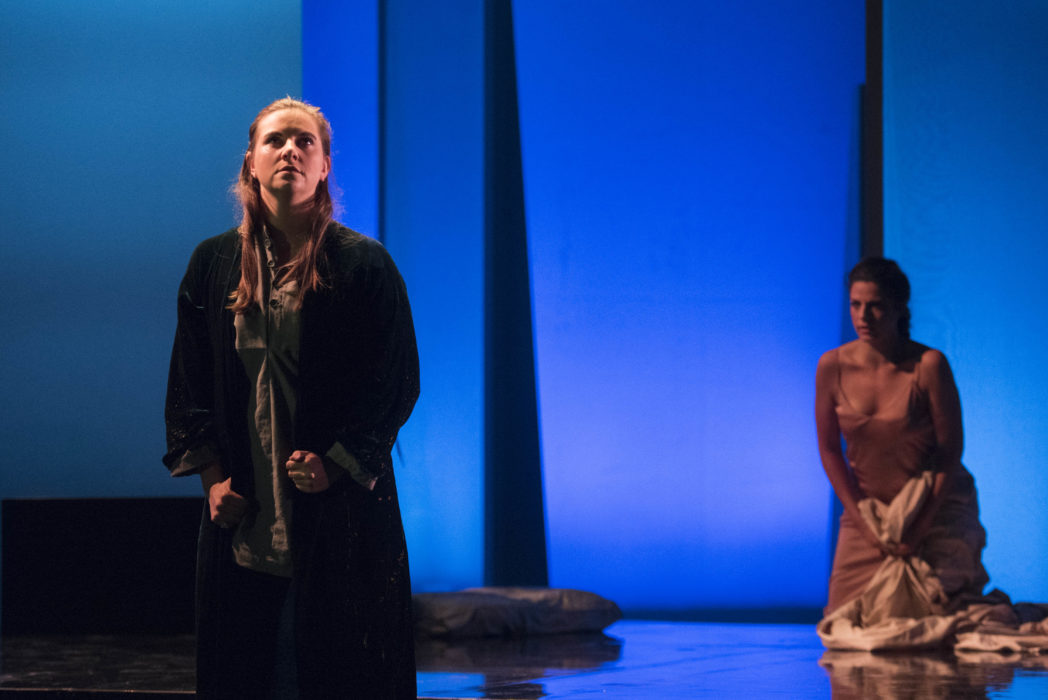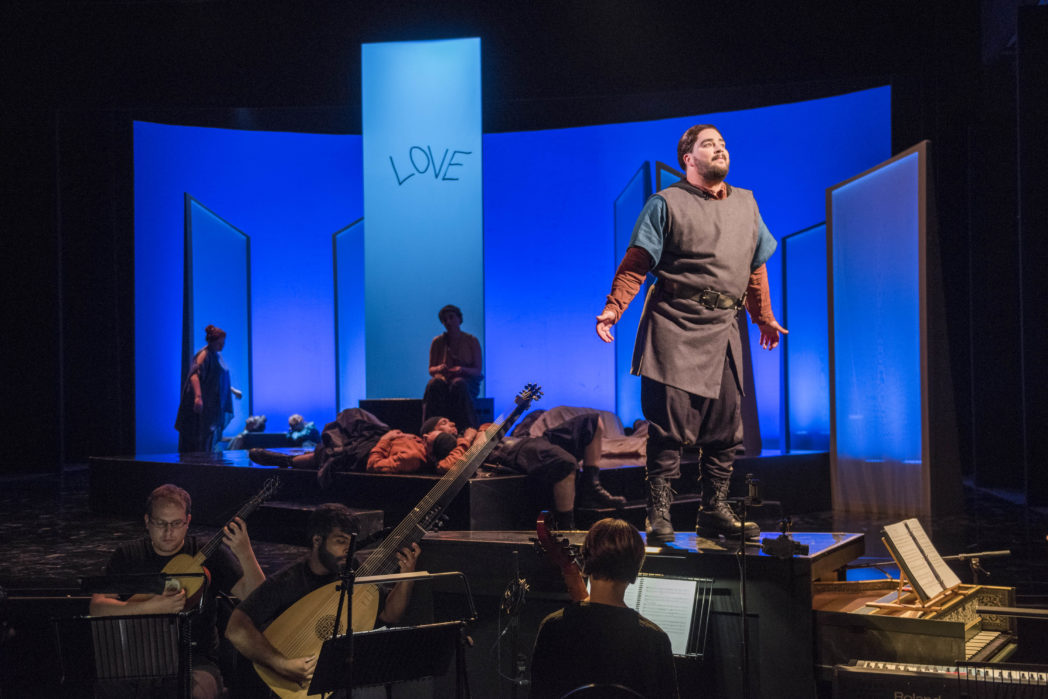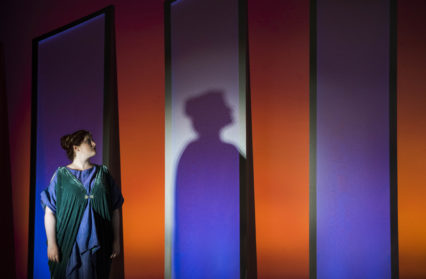Cath Barton reviews the production of Poppea at Longborough Festival Opera.
L’incoronazione di Poppea – Monteverdi, Longborough Festival Opera
Director: Jenny Miller
Conductor: Jeremy Silver
30th July 2018
I defy anyone to listen to Monteverdi’s vocal music and remain unmoved. During the 2004 Cheltenham Festival, I Fagiolini gave the first performances of The Full Monteverdi, a dramatisation by opera director John La Bouchardière of the composer’s fourth book of madrigals. The performances took place in the city’s Daffodil Restaurant. To be there, eating a meal, knowing that the singing would be part of it, but not how or when, was thrilling. The singers, partnered with non-singing actors, turned out to be sitting among us, and one of the couples was at the very next table to me. This music, written in 1603, not only conveyed real emotion four hundred years later but did so to electrifying effect. I swear no-one so much as lifted a glass for the duration of that performance.
Watching the new Longborough Festival Opera Young Artist production of Monteverdi’s L’incoronazione di Poppea was, if not as close-up an experience, certainly for much of the opera just as compelling. Premiered in Venice during the 1643 carnival season, this is no light entertainment, but an exploration of lust for power and the consequences of that. The opera was the first to include representation of real people rather than characters from myth and legend. In first century Rome, the Emperor divorced his first wife wife Octavia, his advisor Seneca committed suicide (possibly) when so commanded by Nero, and Nero married his lover Poppea, who had renounced her previous husband, Oto. The interactions between the characters in the opera, and the interventions from the Gods of Fortune, Virtue, Love and Wisdom with which the opera is embellished are of course creations of Monteverdi’s librettist Giovanni Francesco Busenello.

At the end of the opera Poppea and Nerone (Nero) sing one of the most famous, and searing, love duets in opera. But this is not romantic love, or indeed a happy ending. In Jenny Miller’s production it is played as triumphant lust, as the two start tearing their clothes off. The music moves to an almost unbearable climax, and we know, because it is another historical fact, although nowhere in the opera, that Nero subsequently murdered Poppea while she was pregnant with his child. So the story of the opera continues to spool out after the stage lights have dimmed.
All the drama is there in Monteverdi’s music, and as Longborough’s new Artistic Director, Polly Graham, said in my recent conversation with her about her directing work, singing is a way of heightening the drama. It seems to me that the challenge for the director of this opera is to underline that drama without overplaying it, and to find ways of making it speak to contemporary audiences.
Jenny Miller’s concept for this production of playing the gods as stroppy teenagers – complete with hoodies and little sparkly backpacks – who know better than their elders, is one which works well. Anna Cavaliero and Isabella Cheevers, as La Fortuna and La Virtù respectively, arguing about which of them is most powerful, until Chiara Vinci as Amor sets forward audaciously onto what appears to be the top of the harpsichord to declare that it is Love that is really in charge, set the opera off to a lively start. These three characters, played with humour and agility, act as a collective mischievous Puck throughout the opera.
The clean set for the Longborough production by Nate Gibson features glass-like shards, in a suggestion of things broken, in the middle of which stands a plain white panel, on which the teenagers aka gods scrawl graffiti as the action proceeds. The first word scrawled on there – ‘Love’ – is soon cleverly transformed to ‘Revolution’. Other words are added and themselves changed as the deceptions of the story unfold.
Into the energetic vortex created by the gods steps Poppea, played with palpable sensuality, both vocally and physically, by Sofia Troncoso, an American soprano of South American heritage making a stunning Longborough debut. Alongside her, British mezzo Anna Harvey is a restrained and vocally assured Nerone. Their early duetting, voices entwining in farewells as they part after a night of passion, is a foretaste of the dramatic tension of the great duet at the climax of the opera, a sort of vocal amuse-bouche.

The annual Young Artist production at Longborough is a wonderful opportunity for singers at an early stage in their career, providing them with supportive coaching and mentoring in the process. Vocally, these singers were all well cast; their singing sparkled throughout and some of these young performers showed great acting panache as well. I was particularly taken by mezzo Beth Taylor as Poppea’s nurse Arnalta. She sang her lullaby to Poppea, ‘Oblivion soave’, with an exquisite legato line. This scene was a welcome still moment in the opera. I would have liked a few more such moments; sometimes there seemed to be too much going on, with distracting action at the back of the stage which threatened to detract from the music. That said, Beth Taylor also played the forceful side of Arnalta with tremendous and appropriate energy.
Also an energetic force and a delight to watch was soprano Rosie Lomas, flying round the stage as Valletto, page to Nerone’s erstwhile wife Ottavia. An elfin figure, she was perfectly cast in this so-called trouser role. Of course modern voices are quite different from those of the singers of Monteverdi’s day, and early productions used castrati in many roles: Valletto would have been played by a soprano castrato and Arnalta by a contralto castrato. The role of Ottone, Poppea’s duped lover, would have been taken by a contralto castrato. Nowadays a counter-tenor is often cast in this role, as is the case in this production. This does however create a dramatic problem when the action requires Ottone to dress as his new bride-to-be Drusilla for a murder attempt on Poppea.
Monteverdi champion John Eliot Gardiner, asked in a 2015 interview what fascinated him about the composer, said:
“He is sort of the Shakespeare of music, because he manages to combine high culture and low culture; he is concerned with conveying the whole range of human emotions, from the most elevated to the most basic.”
I found there was much in this Longborough production of Poppea that brought Shakespeare to mind. So if Matthew Paine as Ottone, dressed as Drusilla, was reminiscent of Bottom translated into an ass, and briefly a farcical character, perhaps that was not out of keeping. Valletto flirting with the servant girl Damigella – doubled by Anna Cavaliero – held up a mirror to the engagements between the upper class characters; furthermore their duet was musically a prefiguring of the climactic ‘Pur ti mi’ duet between Nerone and Poppea. And, indeed, the whole range of human emotions was on display. At one point the surtitles tell us that Nerone is singing that ‘reason is not useful for those who command.’ Any comparisons with the antics of present-day politicians would be entirely understandable.

There is more deserving special mention. The set-piece of Seneca’s suicide, while a male-voice chorus try to dissuade him, is highlighted by the effects created by lighting designer Matt Cater. Bass-baritone Mattthew Buswell, as the ill-fated voice of reason Seneca, convinces. Amongst the other men, tenor Laurence Kilsby stands out as the poet Lucano in duet with Nerone as they celebrate the death of Seneca.
The Oxford-based period instrument orchestra Instruments of Time and Truth, conducted from the harpsichord by Jeremy Silver, provided such musical accompaniment and interludes as Monteverdi required of them with style. Most of the scoring, though, is for continuo instruments, the lion’s share of the accompaniment being nimbly provided by Toby Carr and Ryaan Ahmed on theorbo and Imogen Seth-Smith on viola da gamba.
As the opera moved towards its climax the gods, wearing bright headlamps, literally threw an encircling spotlight on the pairing of Nerone and Poppea. The tension was wound up to breaking point, and I found myself literally holding my breath during the final duet. While I felt at the time that there was sometimes too much business going on in this production, on reflection I think it was perhaps necessary to dispel some of the intensity inherent in Monteverdi’s music.
The experience of going to Longborough Festival Opera is a special one, a privilege which I sincerely hope that Polly Graham, as she takes on the reins as Artistic Director, will in years to come succeed in making available more and more widely.
Header photo by Matthew Williams-Ellis
You might also like…
Celebrating the centenary of Leonard Bernstein and the operatic settings of Shakespeare, Welsh National Opera’s 2018 gala was an eclectic mix of theatre favourites.
Cath Barton is a regular contributor to Wales Arts Review.



 Enjoyed this article? Support our writers directly by buying them a coffee and clicking this link.
Enjoyed this article? Support our writers directly by buying them a coffee and clicking this link.







